Who is here? 1 guest(s)
|
Tachinidae - Lydina aenea
|
|
| Morten A Mjelde |
Posted on 11-08-2022 22:01
|
|
Member Location: Posts: 6188 Joined: 29.11.15 |
Light trap in garden. Southern Norway 10 August. Body length: 5.9 mm.
Edited by Morten A Mjelde on 13-08-2022 17:59 |
|
|
|
| Morten A Mjelde |
Posted on 11-08-2022 22:01
|
|
Member Location: Posts: 6188 Joined: 29.11.15 |
2 |
|
|
|
| Morten A Mjelde |
Posted on 11-08-2022 22:02
|
|
Member Location: Posts: 6188 Joined: 29.11.15 |
3 |
|
|
|
| Morten A Mjelde |
Posted on 11-08-2022 22:02
|
|
Member Location: Posts: 6188 Joined: 29.11.15 |
4
Edited by Morten A Mjelde on 11-08-2022 22:03 |
|
|
|
| Morten A Mjelde |
Posted on 11-08-2022 22:04
|
|
Member Location: Posts: 6188 Joined: 29.11.15 |
5 |
|
|
|
| Morten A Mjelde |
Posted on 11-08-2022 22:05
|
|
Member Location: Posts: 6188 Joined: 29.11.15 |
6 |
|
|
|
| Morten A Mjelde |
Posted on 11-08-2022 22:06
|
|
Member Location: Posts: 6188 Joined: 29.11.15 |
7 |
|
|
|
| Morten A Mjelde |
Posted on 11-08-2022 22:06
|
|
Member Location: Posts: 6188 Joined: 29.11.15 |
8 |
|
|
|
| Zeegers |
Posted on 12-08-2022 07:50
|
|
Member Location: Posts: 18446 Joined: 21.07.04 |
First impression is Lydina, bit it is not as black as I am used to. Maybe result of the strong flash ? Theo |
|
|
|
| John Carr |
Posted on 12-08-2022 13:23
|
|
Member Location: Posts: 9773 Joined: 22.10.10 |
Zeegers wrote: First impression is Lydina, bit it is not as black as I am used to. Maybe result of the strong flash ? Theo I was also thinking Polideini. Sternite 5 has the right shape for Lydina (O'Hara 2002 figure 72). |
|
|
|
| Zeegers |
Posted on 12-08-2022 14:08
|
|
Member Location: Posts: 18446 Joined: 21.07.04 |
Good point. If you still have the specimen, you can check whether lappets of posterior spiracle are “Rhinophorid / Polideini”- like Theo |
|
|
|
| Morten A Mjelde |
Posted on 12-08-2022 22:58
|
|
Member Location: Posts: 6188 Joined: 29.11.15 |
Thank you so much John and Theo! The fly is rather dark. I think it may be similar to Lydina aenea (which I found in a light trap on 1 August last year), but the third antennal segment is different. Not sure what "Rhinophorid / Polideini"- like is, but perhaps the attached picture can tell something. |
|
|
|
| Zeegers |
Posted on 13-08-2022 07:09
|
|
Member Location: Posts: 18446 Joined: 21.07.04 |
This is what it is  There are two lappets of equal size, which is very unusual in Tachinidae and the almost unique feature for Polideini. In other Tachinidae, one lappet fills the whole aperture and the other is strongly reduced. Theo |
|
|
|
| Morten A Mjelde |
Posted on 13-08-2022 12:27
|
|
Member Location: Posts: 6188 Joined: 29.11.15 |
Thanks! Interesting! So then it's Lydina aenea? Cannot find Lydina or Polideini in The Tachinids (Diptera: Tachinidae) of Central Europe. Morten |
|
|
|
| John Carr |
Posted on 13-08-2022 13:50
|
|
Member Location: Posts: 9773 Joined: 22.10.10 |
Morten A Mjelde wrote: Thanks! Interesting! So then it's Lydina aenea? Cannot find Lydina or Polideini in The Tachinids (Diptera: Tachinidae) of Central Europe. Morten You have only the one species in Europe. It keys out at couplet 114 with summary on page 95 in the English version of The Tachinids (Diptera: Tachinidae) of Central Europe. That publication places Lypha and Lydina in tribe Linnaemyini. The original German version was written before O'Hara defined the Polideini and revised the North American species. |
|
|
|
| Morten A Mjelde |
Posted on 13-08-2022 17:58
|
|
Member Location: Posts: 6188 Joined: 29.11.15 |
Thank you very much, John, for the useful information! Morten |
|
|
|
| Jump to Forum: |


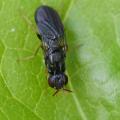



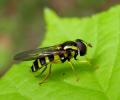
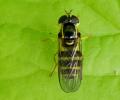

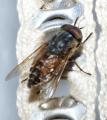
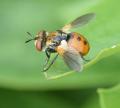



 but don't see the image in the post.
but don't see the image in the post.